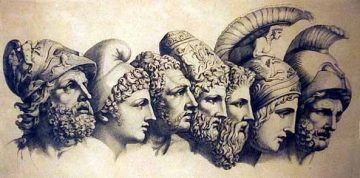by Gabrielle C. Durham
 Did completing your taxes seem a Herculean task? Did cleaning your adolescent bedroom compare to mucking the Augean stables? Are you more jovial or saturnine by nature? Do you or anyone you know suffer from narcissism? Did you see the movie Titanic? Have you ever been hypnotized? Do you want to go on an odyssey? These questions are all so tantalizing, no?
Did completing your taxes seem a Herculean task? Did cleaning your adolescent bedroom compare to mucking the Augean stables? Are you more jovial or saturnine by nature? Do you or anyone you know suffer from narcissism? Did you see the movie Titanic? Have you ever been hypnotized? Do you want to go on an odyssey? These questions are all so tantalizing, no?
These are not the non sequiturs they may initially seem. Each one refers to Greek or Roman mythology. From echoing valleys to arachnophobia, mythology is a vocabulary geyser for so much of the Western world. Mythology serves us so well for these are the timeless stories of our culture. Depending on how you ethically roll, mythology tends to be more convenient, more easily encapsulated than most forms of organized religion. There’s no grey area with the Greek and Roman gods: Zeus/Jupiter was a tramp, Ares/Mars was a hothead, and Aphrodite/Venus was trouble to any romantic union.
After reading and hearing some of the myths and how they reverberate through literature and entertainment, we grasp some universals of human behavior. The characters and their situations serve as shorthand. Don’t we all understand the admonition not to be arrogant like Icarus and fly too close to the sun with our waxen wings? For those of us who indulge, perhaps overmuch in some bacchanals, we know In vino veritas (In wine there is truth), courtesy of Dionysus/Bacchus. This saying conveys in many languages.
Here are some of the stories behind the terms used in the first paragraph.
Herakles/Hercules was a Greek hero who was promised immortality if he could complete 12 impossible tasks, including beheading the nine-venomous-headed Hydra, stealing the belt of Hippolyta, queen of the Amazons, and cleaning the endless stables of King Augeas in one day. Any Herculean task seems impossible and requires either great strength or great dexterity.
The word “jovial” comes from the vocative form of the Roman god Jupiter’s name, Jove, as in the phrase “By Jove!” Jupiter/Zeus was believed to share his happiness and good fortune through his good nature (despite countless examples of his not-so-good temper). Is a gregarious or convivial person god-like? Possibly.
“Saturnine” comes from the Roman god of agriculture, who is depicted with two faces. His was a gloomy, bitter disposition, and anyone born under this sign is also supposed to share these personality traits.
There are several versions of the myth of Narcissus. The most common is that the young, attractive man Narcissus spied his own reflection in water and fell instantly, hopelessly in love. He died when he could not possess the object of desire (himself), leaving only the flower we now call narcissus. His flagrant self-love had bestowed the name of narcissistic personality disorder. Echo was an unfortunate nymph who loved Narcissus so desperately, but due to an advanced case of logorrhea, was forbidden to speak her own words and could only repeat what other people said until she withered away to only the sound of a voice.
The great, unsinkable ship Titanic was named after the children of Gaia and Uranus and the progenitors of the Olympians, including Zeus and Hera: the Titans. The Titans included Cronus, who ate his children Zeus, Demeter, Hades, Poseidon, Hera, and Hestia, goddess of the hearth. The Titans were supposed to be indomitable, much like the cursed cruise liner.
“Hypnotized” comes from the god Hypnos, who was steward of sleep and the father of Morpheus, or dreams. At least twice, Hypnos outwitted the father of gods Zeus with his somnolent powers.
An “odyssey” is a great trip, inspired by Homer’s Ulysses, aka The Odyssey. The hero is the trickster Odysseus, who survived the Trojan War only to be blown all over creation on his way home to Ithaca to wife Penelope and son Telemachus. He endured many trials in his decade’s journey, including withstanding the Sirens’ song, Circe’s seduction of him and turning his men into pigs, and passage through Scylla and Charybdis (in present-day Turkey). May your odyssey be far less adventurous than his was.
Tantalus was another son of Zeus. He committed some minor infractions in the name of greed, which incurred the gods’ ire, but they gave him the benefit of the doubt, until he cooked and served his son Pelops to them for a feast. The Olympians were so horrified that they devised his punishment to be placed close to water and a fruit tree but never able to consume either. He was doomed to suffer from eternal thirst and hunger; every time he tried to take a bite from the nearby fruit tree or sip from the water, the items would move just out of reach and he would be thwarted in his desires, forever “tantalized.”
“Arachnophobia” comes from Arachne, a skilled weaver who challenged the goddess Athena to a competition. (When will humans learn not to challenge the gods? It never works out the way they think it will.) Athena was insulted and transformed Arachne into a spider, who continues spinning her intricate webs today.
We didn’t even touch on any of the other mythologies that serve our language and idiom. Let’s hope some of the old gods don’t take it too personally.
